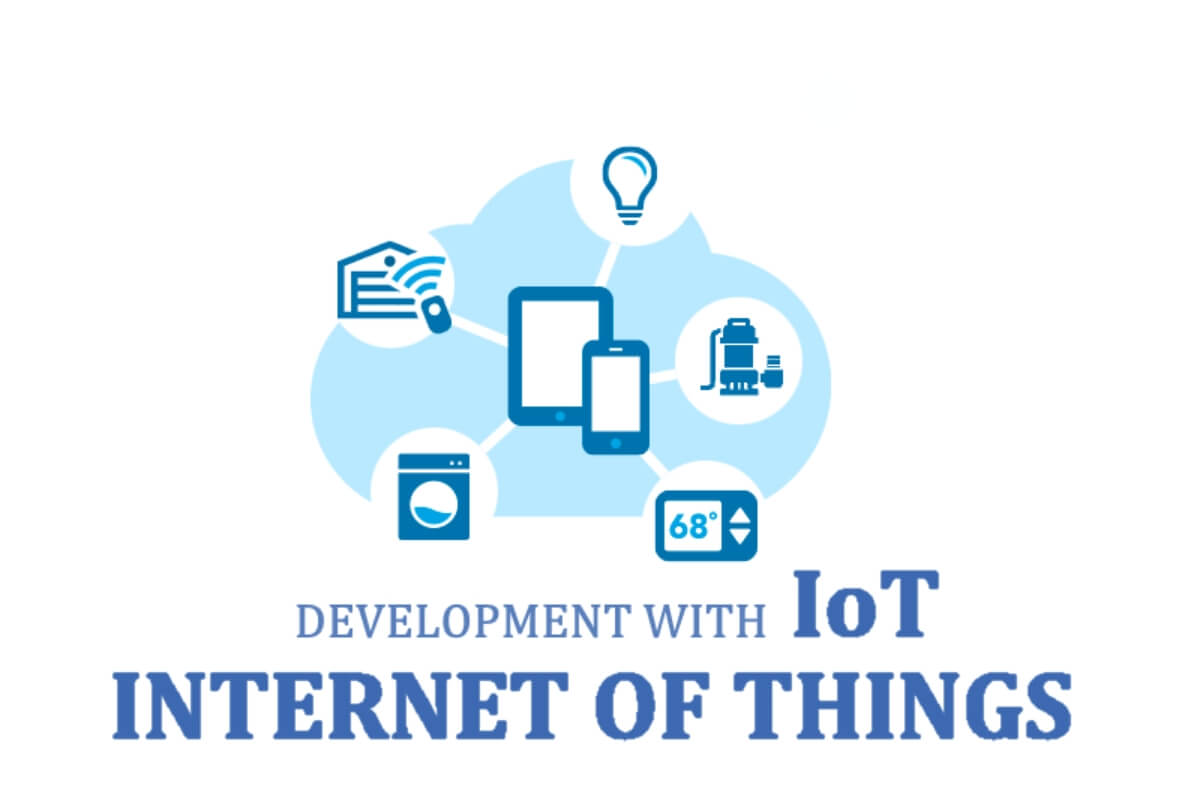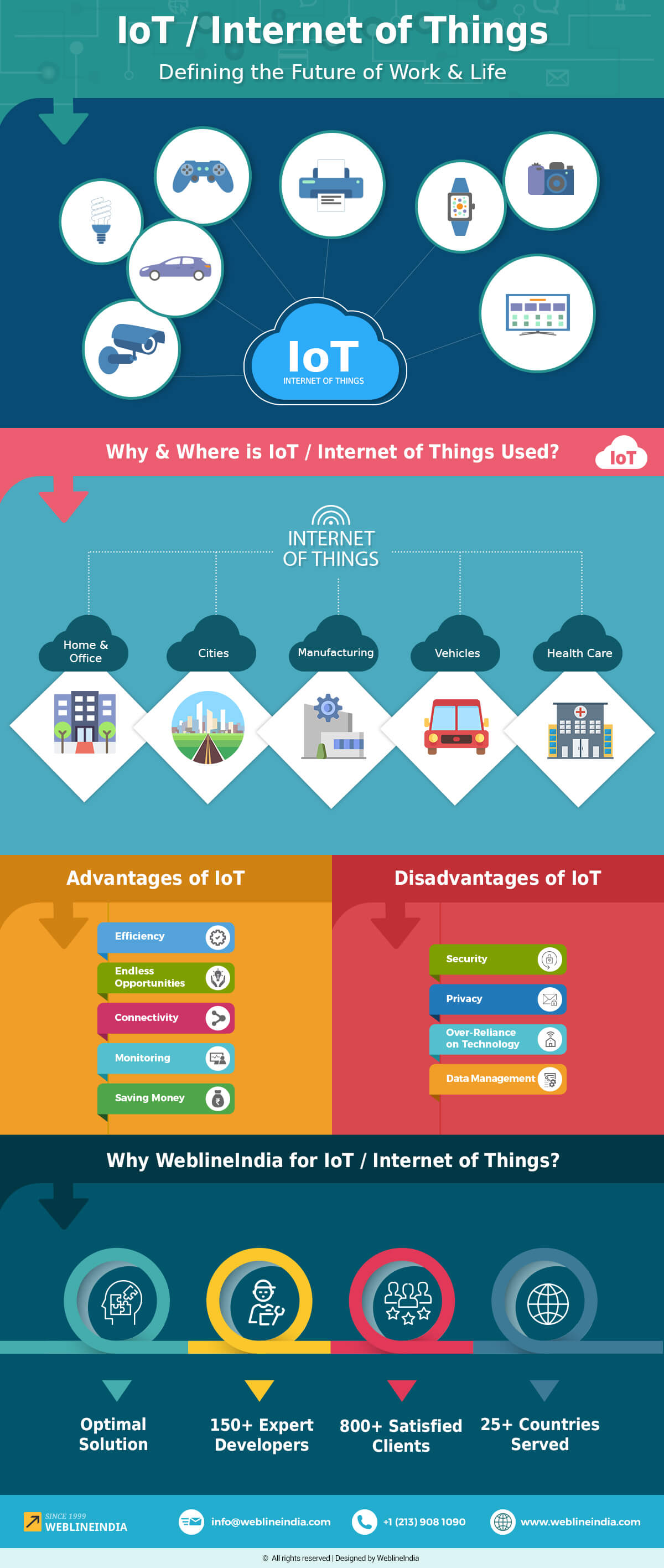
Internet of Things (IoT for short) has been one of the hottest topics of conversation over the last few years. Tech gurus, business managers, and even general public have all been curious about the rising eminence of Internet of Things and the impact that it will have on our life and work. Before we go ahead and talk about the various effects of IoT, let us first explain what this technology is.
Simply put, Internet of Things is a complete ecosystem of devices that are connected through the internet. These devices can communicate to each other via the internet and make our lives more efficient. Examples of such IoT devices include washing machines, cell phones, lights, wearables, coffee makers, etc.
Let us take an example to explain this concept more clearly. Think of a smart refrigerator. Wouldn’t it be great if your refrigerator could talk to your cell phone? So, if the internal cameras of your smart refrigerator identified depleting levels of milk in the carton or if the carton was past its use-by date; it can send you a text. This way, you are informed and can bring milk home before you are completely out. There are other concepts as well that include transportation, home heating, energy use, etc. How about your home heating system could automatically identify what level of heat to put to make you comfortable? It could reduce the heat when it is sunny outside or when you are not at home. That will certainly bring down our energy bills and help the environment too.
An analyst firm, Gartner, suggests that by the year 2020 there will be close to 26 billion connected devices. This number does indicate the immense importance that IoT will go on to have in our personal as well as work lives.
Why & Where is Internet of Things Used?
One of the most prominent reasons for Internet of Things (IoT) to be used is the improved efficiency. It makes us and our devices more productive and efficient. Moreover, these systems will make our lives simpler too.
Let’s look at some of the applications of IoT
- Home & Office
There are various applications of IoT at the home and office level. How simple would our life be if our alarm clock, after waking us up at 7 am, sent instructions to the coffee maker to start brewing coffee? There are many other such examples that can be used. Additionally, there already are printers that automatically recognize when they are running low on toner and order toners. Other office equipment can function in the same way too.
- Cities
So, we spoke about the impact that technology can have on our homes and offices. However, cities can also benefit from this new technology. More than half of the world’s population today lives in an urban dwelling. By 2050, this number will be over 60%. This would mean that all the issues that cities are facing today like population and traffic will only aggravate. That is where IoT can help resolve some of the problems. Smart stoplights can be created that adjust the green & red on the basis of the time of day as well as where the cars are in the intersection. There are sensors being embedded in Barcelona’s Born Market to relay real-time parking information to drivers.
- Manufacturing
This industry is ahead of all other industries in terms of the utility of IoT and its applications. When it comes to managing machinery, warehousing, and more; there are many ways in which Internet of Things can help with automation and device connectivity.
- Vehicles
Cars are becoming smarter. Today, cars can identify when you are running low on gas and navigate you to a near-by gas station. Plus, there’s technology to identify lane departure and keep you in the same lane. Self-driven cars are on the way. In the future, your cars might be able to access your calendar and know the best route to take for the meeting. If you are stuck in traffic, a text can be sent to the other parties to notify them that you will be late.
- Health Care
IoT can play a significant role in health care too. Automatic medicine dispensers can be installed in homes and can be monitored by your medical staff. When you check your blood pressure at home, a report can be stored in your medical records for your medical staff to check.
There are various other industries that utilize IoT technology based applications. These include agriculture, energy, logistics, and more.
The IoT Ecosystem
The IoT Ecosystem is made up of multiple participants. The first among them is a remote. This remote sends instructions to an IoT device. This remote could be a smart phone, tablet, etc. The second element of the ecosystem is the network. The network facilitates the communication between the remote and the IoT device. IoT devices are the third element in the IoT Ecosystem. They perform the instructed task and send information back to the remote via the network. Another element in the Ecosystem is the Analytics / Data storage side of IoT. There is a lot of data being generated and it needs to analyzed and displayed on the remote.
Top IoT Industries
Most industries find an application in IoT. However, the following 5 industries are experiencing the highest level of advantage through the same.
- Agriculture
Yes; you read it right. Agriculture is becoming a big industry for IoT. IoT based devices are being used by farmers to analyze their crops to find out the best time to sow seeds, crop yields, etc.
- Healthcare
Not only is IoT significantly improving patient care, it is also helping hospitals to keep their machines in good order. MRI machines and other equipment are hooked on to the internet to promptly gauge the need for maintenance. In the case of hospitals, such prompt service can be the difference between life and death of a patient.
- Retail
Retail stores are using IoT in multiple ways. One of the implementation works with Bluetooth Beacons. This can enable the retailer to send location-based, personalized deals to their customers when they are nearby to Beacons.
- Logistics
Transportation and logistics can also benefit from Internet of Things based technology. As an example temperature sensors can be connected to shipping vehicles to ensure perishable goods are being delivered in good condition.
- Manufacturing
Manufacturers are connecting their factories to make them more productive. Moreover, machine breakdowns can be quickly addressed by the concerned department to reduce any hold-ups in the factory.
IoT Based Platforms
Here are some of the top IoT based platforms available in the market:
- Microsoft Azure IoT Hub
- Google Cloud Platform
- IBM Watson IoT Platform
- Amazon Web Services IoT Platform
- Cisco IoT Cloud Connect
Advantages of IoT
- Efficiency
By having things automated, we will be able to make our lives & work more efficient. We will be able to get more work done, and that will contribute significantly to the economy. As an example; if our alarm clock would wake us up and instantly send instructions to the coffee maker to start brewing coffee, it will save us the time for us to perform other more strategic tasks.
- Endless Opportunities
There are numerous opportunities that IoT will open up. Many of these opportunities haven’t completely materialized yet and we may not be able to understand their impact. However, they hold the potential of resolving many of our world’s impending problems. Examples of these include auto-driven cars, smart vehicles, remotely managed medicine dispensing, smart refrigerators to identify when we are out of milk or vegetables/fruits and more. Another interesting example is of smart watch app. Recently a company announced that they have developed an app to detect early pregnancy with the help of a smart watch.
- Connectivity
Many of our smart devices will be connected. That will help us perform numerous tasks without being physically present to do so.
- Monitoring
IoT makes monitoring possible. Such monitoring can be applied to other industries and applications, and it can help in making better decisions.
- Saving Money
So, IoT can save money. Here’s how. By making devices communicate with each other and improving efficiency it can help you in making optimum utilization of energy and resources. If there are any bottlenecks in the system, you can be informed about it immediately. That helps in saving money.
Disadvantages of IoT
- Security
Every new technology that connects many devices has the potential of posing a security risk. Our systems can be hacked into and our network can be compromised. Take an example of something as small as our toaster being hacked and that leading to our network being under threat. Security experts are of the opinion that not much is being done to improve security for IoT devices.
- Privacy
A lot of our personal data is being collected in the process. As an example, your refrigerator knows your phone number, your phone has information about your whereabouts, also your phone can open & close your office’s door, your smart watch knows how much you work out and your sleep patterns, and more. You don’t want any of this information to be leaked as it is extremely sensitive.
- Over-Reliance on Technology
This is more sociological than an economic disadvantage. However, we are already relying too heavily on technology. Some might argue that IoT will increase our reliance on technology, and make it difficult for us to survive in a world without technology and gadgets. We lock & unlock doors with smart phones; our alarm clock will automatically instruct the coffee maker to brew coffee, and more. This will all make many aspects of our lives heavily reliant on technology.
- Data Management
Massive amount of data will be produced by such IoT connected devices. Companies will have to soon find a way of storing, tracking, analyzing, and making sense of the huge amount of data that is generated.
Why Weblineindia for IoT?
We understand that adopting new technologies can be difficult for your business. Hence, we conduct a detailed analysis regarding benefits of the technology for your business and offer a solution accordingly. Our experts know what it takes to be the first mover, and we will do what it takes to successfully navigate the great potential that this technology has to offer.
Get in touch with us now for your all offshore outsourcing IoT app development needs.
Blog as Infographics –
Testimonials: Hear It Straight From Our Customers
Our development processes delivers dynamic solutions to tackle business challenges, optimize costs, and drive digital transformation. Expert-backed solutions enhance client retention and online presence, with proven success stories highlighting real-world problem-solving through innovative applications. Our esteemed clients just experienced it.
